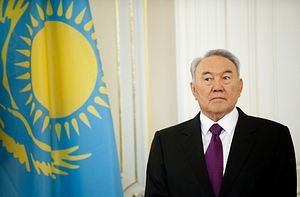Central Asia links:
Russia vs. Turkey: Relations between Russia and Turkey continue to be rough as a result of the Turkish shootdown of a Russian fighter jet in late November. As the feud persists, Central Asia is in a tough spot. An RFE/RL podcast from earlier in the week took a look at tightrope walk regional states are walking between Russia and Turkey; it’s worth a listen. The CSTO’s military committee gathered this week in Moscow and condemned the shootdown, but only Russia and Armenia seem gung-ho about it. The chief of staff of the Armenian armed forces delivered the statement, which came down solidly on the Russian side. Joshua Kucera at Eurasianet wrote that it was “clearly laying it on a bit thick; he seems to be protesting too much.”
Quitting the Kazakh Media Game : Eventually enough is enough. Last week Bela Kudaibergenova, a London-based correspondent for the Khabar agency (a major Kazakh news agency), quit because she was “tired of lying.” According to RFE/RL’s Kazakh Service, Kudaibergenova decided to leave the agency after being asked to cover a gathering organized by the Kazakh Embassy in London:
According to Kudaibergenova, she was expected to present the gathering at a luxury hotel as proof that “Kazakhstan is a great country respected by Britain and the international community.”
“That was it,” Kudaibergenova said. “I felt that enough was enough, and I could not do it anymore.”
Kudaibergenova accused Khabar of deliberately misinforming the Kazakh people. Journalists, she said, are just “cogs in the wheel.” Khabar was founded and until 2004 run by Dariga Nazarbayeva and is partially owned by the state. Kudaibergenova is part of a growing tradition of journalists, employed by post-Soviet media empires, who quit in protest.
In other Kazakh media news, Kenges Rakishev, one of the country’s richest men, has reportedly bought up Sedmoi Kanal (Channel Seven). Plans are for the channel to stay out of news, and focus on entertainment. Eurasianet has the details and looks into the intertwining of the state and the media in Kazakhstan.
How ISIS is Strengthening Authoritarianism: In Uzbekistan, the authorities have launched a significant information campaign focused on ISIS while simultaneously continuing to avoid discussing social ills. In a piece for the BBC, Abdujalil Abdurasulov walks through how the Uzbek authorities use the fear of ISIS to tighten their grip. He notes that while religious leaders (state-sanctioned) and government officials publicly discuss the threats of terrorism, they’re silent on a host of other problems — poverty, corruption, and forced labor — preferring to maintain the slogan that “Uzbekistan is the state with a bright future.” Why? Because fear is useful for keeping people in line:
The government is creating in people’s minds an image of the only possible alternative to the existing regime. After watching a video about IS fighters, one Uzbek citizen told me: “If our president leaves, then these crazy Islamists will come to power in Uzbekistan.”

































